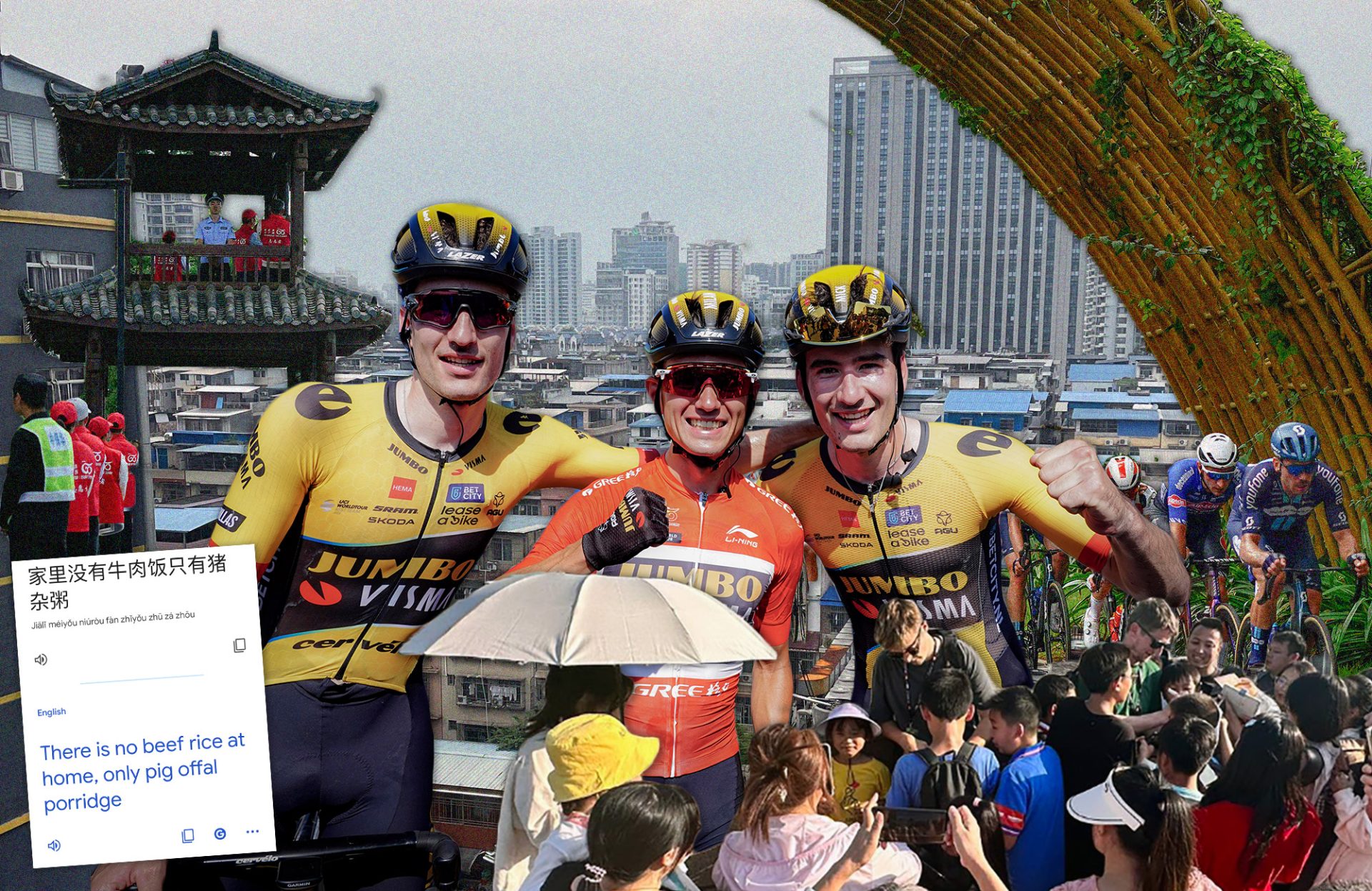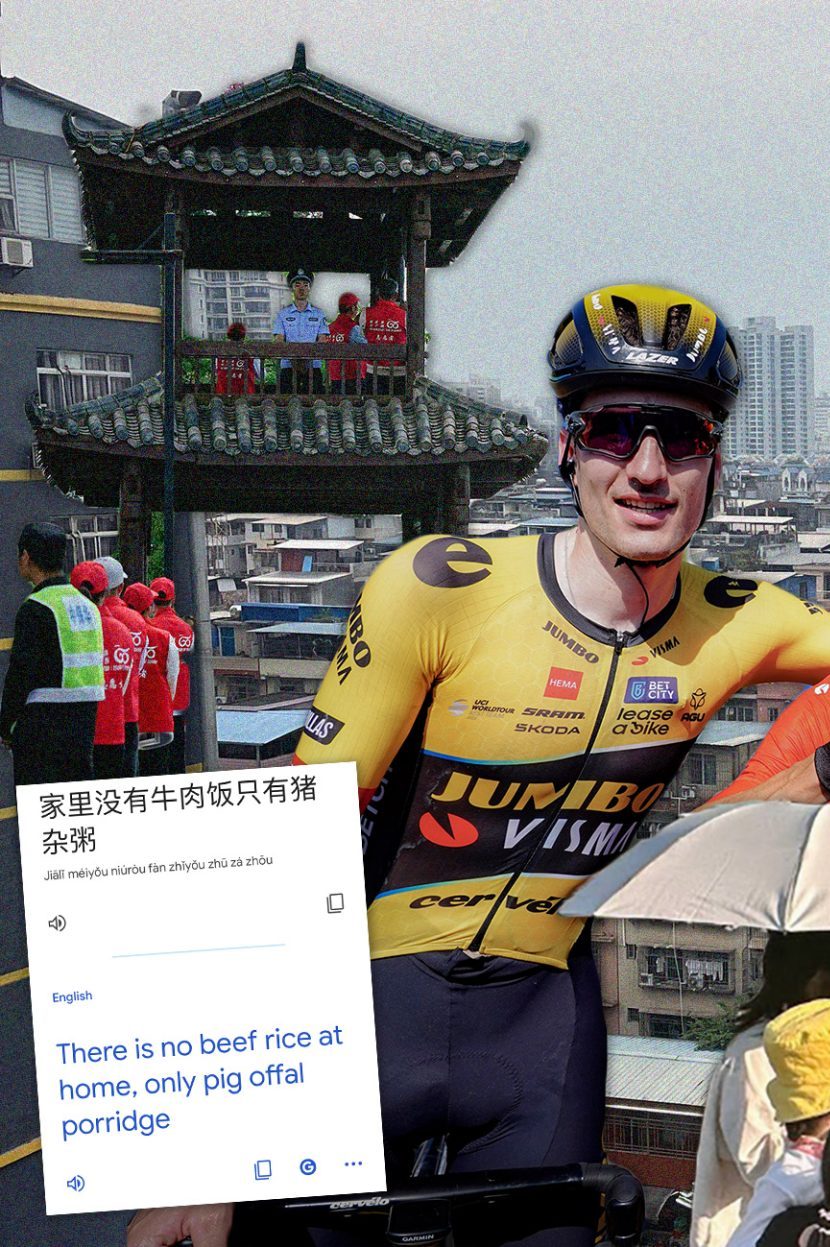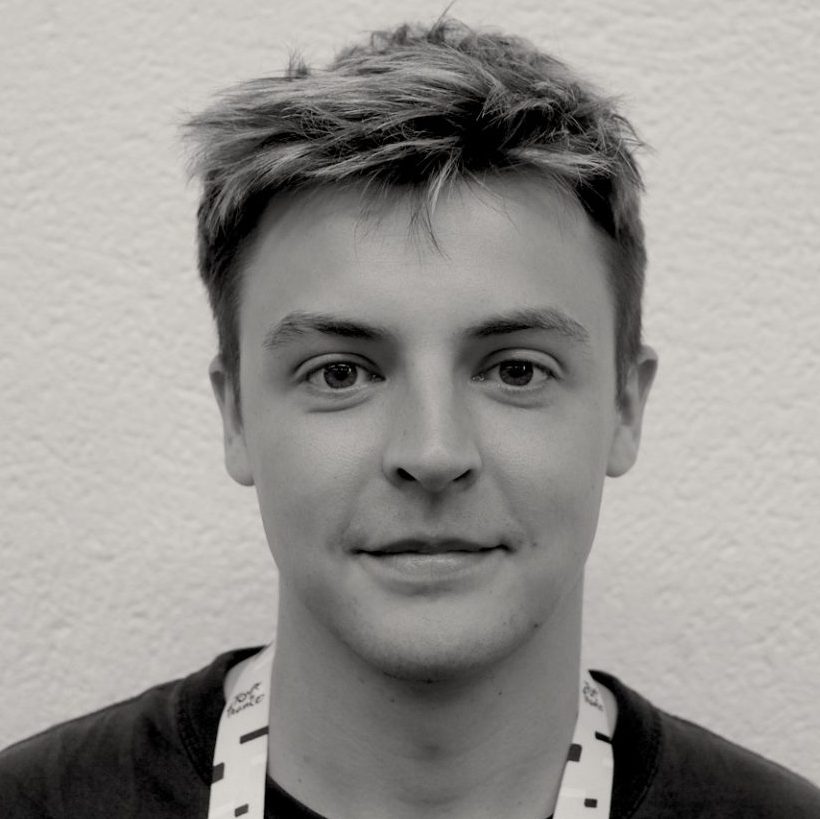The seatbelt sign flashes on and off for the entire connection between Guangzhou and Nanning, like a game of musical chairs but the only people playing are those who are desperate for a piss. I was able to enjoy the charade as I’d reached a zen-like calm upon entering my 15th hour of travel to the other side of the world.
That was because, after an hour and a half battle against the firewall, I had successfully loaded all of my personal info and bank details and welcomed the Chinese government with open arms into my life via the downloading of WeChat. It’s an all-encompassing app that not only functions as the primary social media and way to message other people in China, but also provides you with a bank-linked QR code that acts as your version of ApplePay, and also contains DiDi, the Chinese version of Uber. Without this app, let alone a phone, layers upon layers of everyday friction would be added to your life in China. Nevertheless, having managed to non-verbally convince one of the airport staff to verify my account (you need an existing user to effectively vouch for you in order to be able to use the app) I now had money again, and after a 12-hour flight, in the ghost town that is a late-night trip to the connections area of any international airport, my first meal on Chinese soil would be … a KFC.
Look, here’s the thing. You can get Chinese food at home, but can you get Chinese KFC at home? Checkmate. Anthony Bourdain, eat your heart out.
I land in Nanning close to midnight, and our cars are already waiting outside for the three-hour drive to Beihai, a port city right at the southern tip of the Guangxi region, not far east from the Vietnamese border.
At this time of night the motorways were sparsely populated, but at no point during the journey did I see our lumbering people carrier get overtaken by another vehicle. Every few hundred metres, a white light fastened to the central reservation would flash at us. The driver’s phone would speak the same phrase to him every 15 seconds or so. Already, everything feels so much more controlled than back home. You wonder if you’re projecting the image of the Chinese bogeyman that is instilled in you by the news back home, or whether everything they have told you is actually true.
The taxi driver is the same as in any other country I’ve been. You can sense the aches and pains of sitting down in an unnatural position all day and night. They speak in the same punctuated phrases, conversations they’ve had a million times over with a forever-rotating cast of passengers. He is one of 1.4 billion people living their lives in a country barely seen or understood by those on the other side of the world.
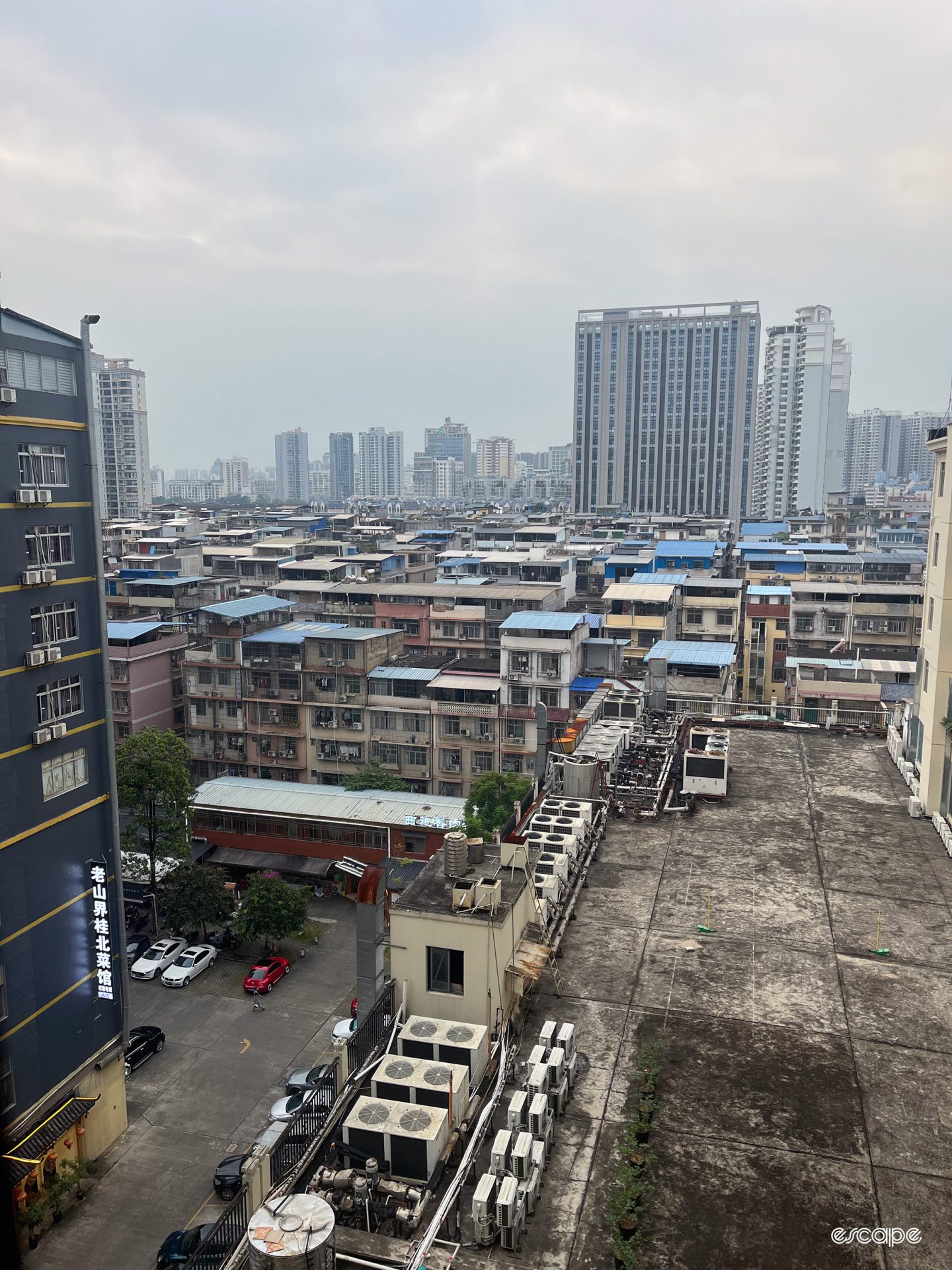
“We have nice hotels and it’s a part of the world we don’t usually come to,” is the assessment from UAE Team Emirates’ Tim Wellens as he sums up two of the positives for riders at the Tour of Guangxi.
We’ve come to a shopping mall in Beihai. A stage has been erected on the ground floor. Customers assemble on the upper floors and look down, trying to figure out what’s going on. The race presentation is soon underway, during which Wellens, the 2017 victor and big name in Guangxi cycling circles, is asked to undertake his promotional duties alongside a number of other fellow riders.
Alpecin-Deceuninck’s Jakub Mareczko, the Italian sprinter of Polish origin, is Asian stage racing’s answer to Mark Cavendish, having won a total of 33 stages at various races on the continent over the years. “Most of the races here finish with a sprint,” the quietly spoken 29-year-old trotted out. “It would be really nice to win here.” His more-effusive compatriot Elia Viviani gives a more insightful verdict: the wider roads lead to safer sprints, and anyway despite his relative old age has a taste for victory following his first win of the year at the recent CRO Race.
With the route revealed, sponsors thanked and China Central Television, CCTV, possessing the shots they need for that day’s news broadcast, we are then approached for interviews by local journalists, we’re not sure where from, and suddenly with the shoe on the other foot. It turns out being interesting, let alone on demand, isn’t that easy.
“Have you been to China before?”
“Erm … no, no I haven’t,” I stutter, remembering that I did go to Hong Kong 10 years ago, but not really sure what the latest status of Hong Kong is these days. So I just keep that fact to myself.
“What do cycling fans think of the Tour of Guangxi?”
“Uhhh … Errr … yeah, they, um, like to see bike racing in a different country to normal.”
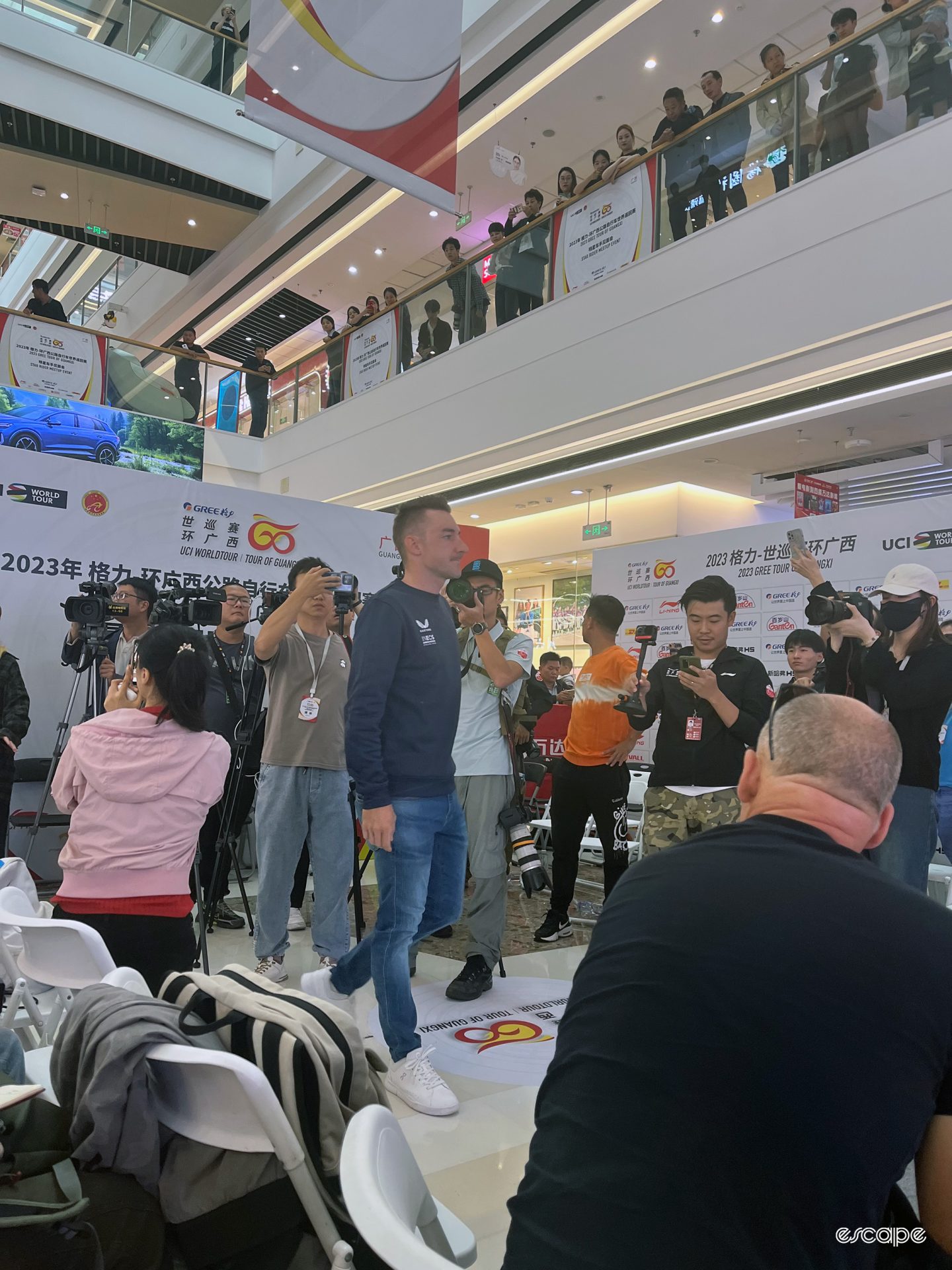
What do people think of the Tour of Guangxi? Out of the complete and utter circus that is professional cycling in general, these auxiliary events – where you would imagine the UCI don’t come out of it losing any money – the answer isn’t an easy one. For the true hardcore audience, tyres on tarmac is tyres on tarmac, every kilometre as important as the other. For teams, it’s a chance to send dissenting, departing, or otherwise undeserving staff and riders on what one colleague unfavourably calls a “punishment tour.” Yet, amongst the ranks of riders who are sucking up one more week of suitcase living and already mentally on the beach, there are those with a point to prove and a WorldTour event to achieve a result at. If half the field doesn’t care, then more the fool them.
“It was a few strange years and from what we heard in Europe, here [lockdown] was even … more,” Viviani said on stage. You can sense the catharsis in the air. That the fact this international event is being allowed to happen at all is one temperature check with a sense of accuracy for regular people of how things are in the country.
Later on, we are shipped over to the team’s hotel for a press conference with Jayco-AlUla. There is some talk that it may be because they are intending to unveil a new Giant trainer from the Taiwanese manufacturer that sponsors the team. For the sake of the team, we hope these new machines are regular-sized.
It turns out that rather than being a normal press conference, we are sharing this one with a roomful of people on a Giant PR day out. Soon we are surrounded by at least two dozen cycling fans who have been presented with the rare opportunity to meet some professional cyclists. A Q&A proceeds, whereby we are saved from having to come up with asking any questions of the seven riders who are very politely pretending to want to be here at this moment in time, because the questions keep coming from the rest of the audience.
One woman raises her hand and takes the mic before belting out a local Guangxi song in order to properly welcome the riders to the region. Then, it’s time for photos. A polite queue forms and each fan scurries into frame for their picture to be taken. Lukas Pöstlberger, who bravely sat front and centre upon entry to the room and is thus the focal point for each photograph, displays inhuman levels of civility as this event drags into its second hour and the photos keep coming. We’re not done just yet, however! Now it’s the time for the new training platform to be unveiled. We take this as our chance to quietly escape the organised chaos as Zdenēk Štybar turns the real pedals for his virtual avatar as the clock ticks down on his final professional contract.
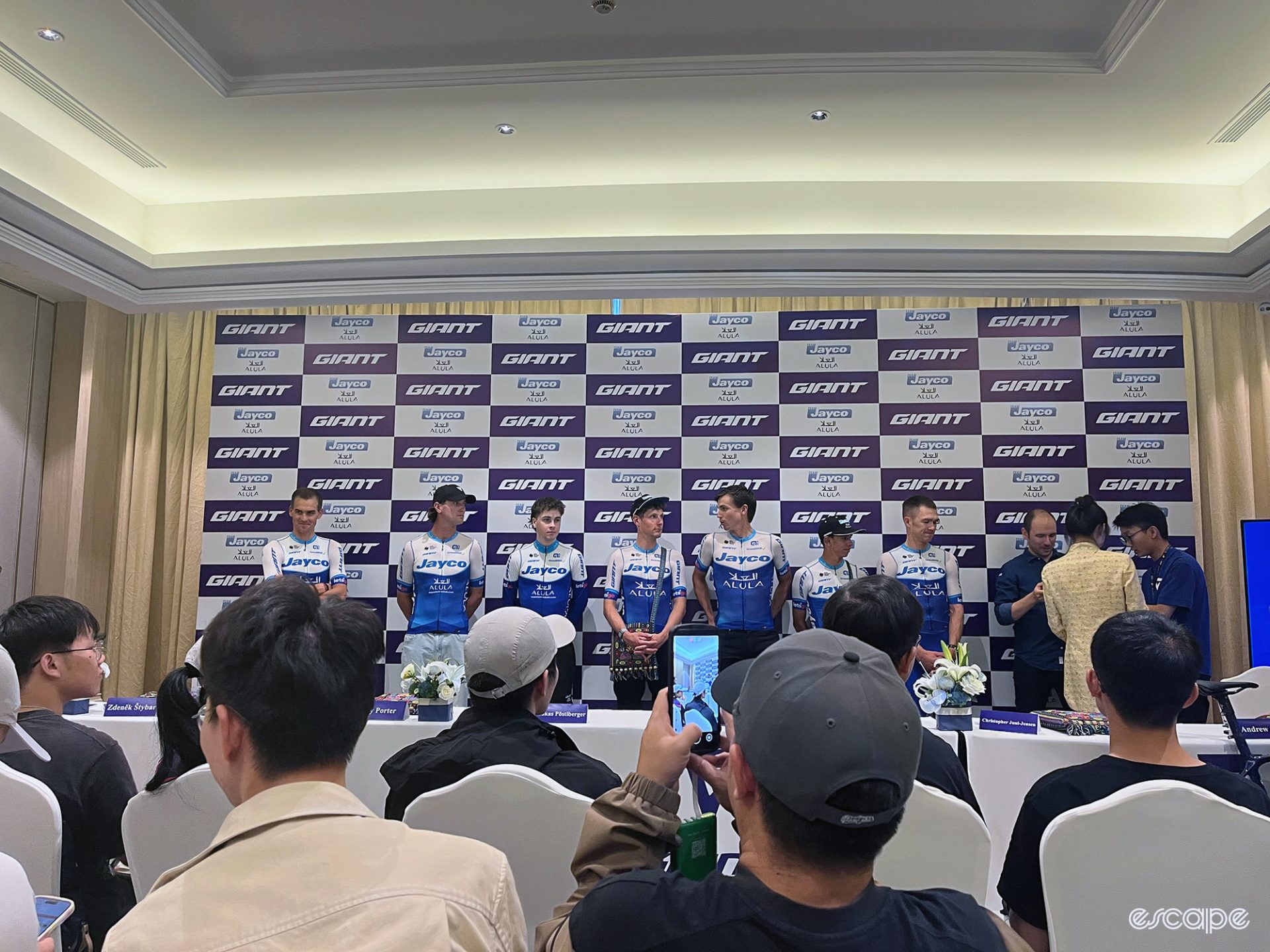
Back at the hotel in the evening, still jetlagged, I wander outside to find some non-hotel food. Across a huge intersection – across which I receive a number of bellowed “HELLOS” from the locals, of which at least some were of a pleasingly mocking manner – is a small restaurant, which, crucially, doesn’t have a bunch of bubbling fish tanks outside of it.
Inside is the owner watching TV on his phone in the table in the middle of his restaurant, his three infant children sat around him slurping noodles from bowls. I point at a rice dish on the wall, he nods and beckons me to the front, points at the WeChat logo and QR code. I scan it and a screen pops up asking for a quantity of Yuan to be entered. Not knowing the price nor having got my head around the currency equivalence yet, I present my phone to him. He types in “20” and I sit back down. A steaming and delicious plate of peppers, beef mince and rice arrives soon after and a notification finally pops up on my phone informing me it’s cost only £2.50. He could have typed in any number and what was I going to do about it? A quick Xièxiè, pronounced she-she, of thanks and I’m gone and he’s back to his daughters and their noodles.
Cultural ablutions
The first stage is a loop around Beihai, which not to be rude but isn’t a place that I would have ever gone to were it not for this bike race, nor is somewhere I will likely ever return. But the beauty of bike racing is it takes you places you’d have no other reason to go to.
It is baking hot and everybody is sweltering under the October sun. The familiar blueprint is that of any European bike race. Riders sign on and are coaxed into speaking some Chinese to the rapturous applause of the audience. Off to the side, the teams are housed under marquees, taking it in turns to get changed in the vans they’ve been lent for the week. The atmosphere couldn’t be more relaxed as fans manage to squeeze between barriers and get signatures and photos with any rider within earshot and willing to turn around.
The stage gets underway and the racing is perfunctory enough. Elia Viviani becomes the first, slight surprise, winner, besting compatriot Jonathan Milan. Viviani’s Ineos Grenadiers teammates gather around him for a celebration photo and it certainly looks like winning in Guangxi is a lot more fun than not winning in Guangxi.
After another stage start in Beihai the following morning for stage 2, we are finally on the road and will be seeing more of China beyond the square kilometre surrounding the hotel that’s housed us for the past three days.
The first thing to notice is the number of people who have lined up by the side of the road, intrigued to see what’s going on. In more remote areas, you can see the shock on people’s faces, especially children, when they see a white person looking out the window of the bus.

The next thing you notice is that not all roadside spectators are the same. Some are wearing red jackets, and are ostensibly volunteers making sure the area around the race route is safe and secure. Most of these “volunteers” are teenagers, some are facing away from the road, looking out at fields to make sure the area is secure while sneaking peeks behind when they hear the approach of a car or something more interesting than the patch of grass they’ve been staring at for the past few hours. There are similar groups of red-capped youths at the start and finish areas, equipped with plastic clappers to provide some enthusiasm to the proceedings.
Sometimes, they stand in areas chalked out on the pavement, arranged orderly and right in front of the podium, while off to the side, passersby gather to see what all the fuss is about. As Jonathan Milan clambers onto the stage, towering over everyone else, he poses for photos with that day’s local dignitaries. It may be the Autonomous Region of Guangxi’s Deputy Chairman In Charge Of Sanitation, or maybe the Vice-Chief In Charge Of Security, neither of whom are people you would deign to fuck with, but who all pose for their photos by raising either one or two hands out perpendicularly from their bodies for either a single or double thumbs up– that must be in the CCP guidebook, presumably.
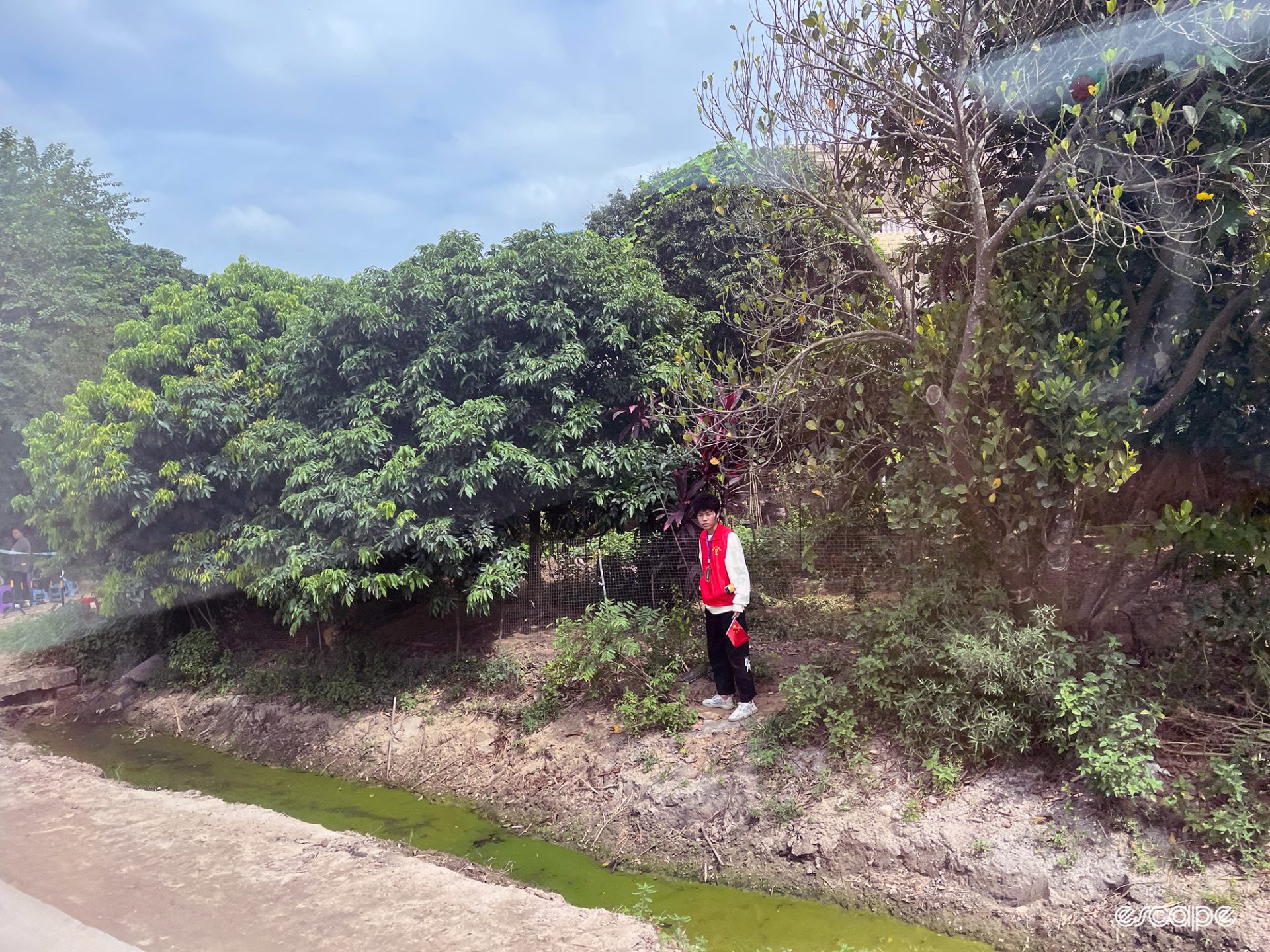
It is at this juncture that I must tell you the podium areas became an increasingly unattractive prospect for my international media colleagues and myself. That’s because, with the riders safely cocooned behind barriers while we are at liberty to roam around like the free-range chickens that we are, we became the primary target for the ultimate quest of the Guangxi-ers in the vicinity: get a photo with a foreigner.
It did immeasurably terrible things for my ego that – due to my relative youth and likely my doomed quest to hold onto my twenties through a dogged loyalty to having a friendly Moldovan lady called Ana-Maria sort me out with frosted tips every quarter – I was treated like an Avenger at Comicon.
If we stood in the same place for a minute, it wouldn’t be long before an actual queue formed of people wanting to have their photograph taken with me. There I was, obliging with requests to pose with a peace sign, or using my thumbs and forefingers to complete a heart shape. Before long, I was signing children’s shirts, probably condemning the proud recipient to a bollocking from their mother upon returning home. “Whose f***ing signature is this??!” I drew the line when asked to provide my WhatsApp, Instagram, and WeChat handles, to which I was widely mocked by my colleagues at having become too “big time” already. After a few days of life as a minor provincial celebrity in China, a possible answer arrived.
Apparently, I may bear a passing resemblance to Edison Chen, a Canadian-born Hong Kong singer and actor, who was the most Googled person in China in 2008 after his photo scandal. I excitedly messaged my girlfriend of my new-found fame and that I was weighing up my options as to whether I would return home or remain and make a new life for myself in Guangxi. I’ve always wondered what it would be like to be an Instagram influencer, doing nothing much but staring into a ring light until I go blind and lying in bed eating yoghurt every day.
On stage 3, when I had found a nice set of steps to perch on outside in the sunshine and watch the race on the big screen, a queue of red-shirted children soon appeared for photos. After rattling through the selfies I gave up my spot and quickly headed back inside the press tent that was maybe three metres by three metres and containing about 20 people at any one time. But at least I could go five minutes without putting on a gormless smile that will live forever on a phone buried in the landfills of the future. Honestly, you have no idea how hard it is being this popular. And no I wouldn’t expect you to understand. Fortunately, my head deflated back down to size as soon as I got to Beijing at the end of the race, whereupon no-one gave me a second glance. My five minutes of fame were dead and buried. But I will exist forever in the camera rolls of literal hundreds of Guangxi’s youth.
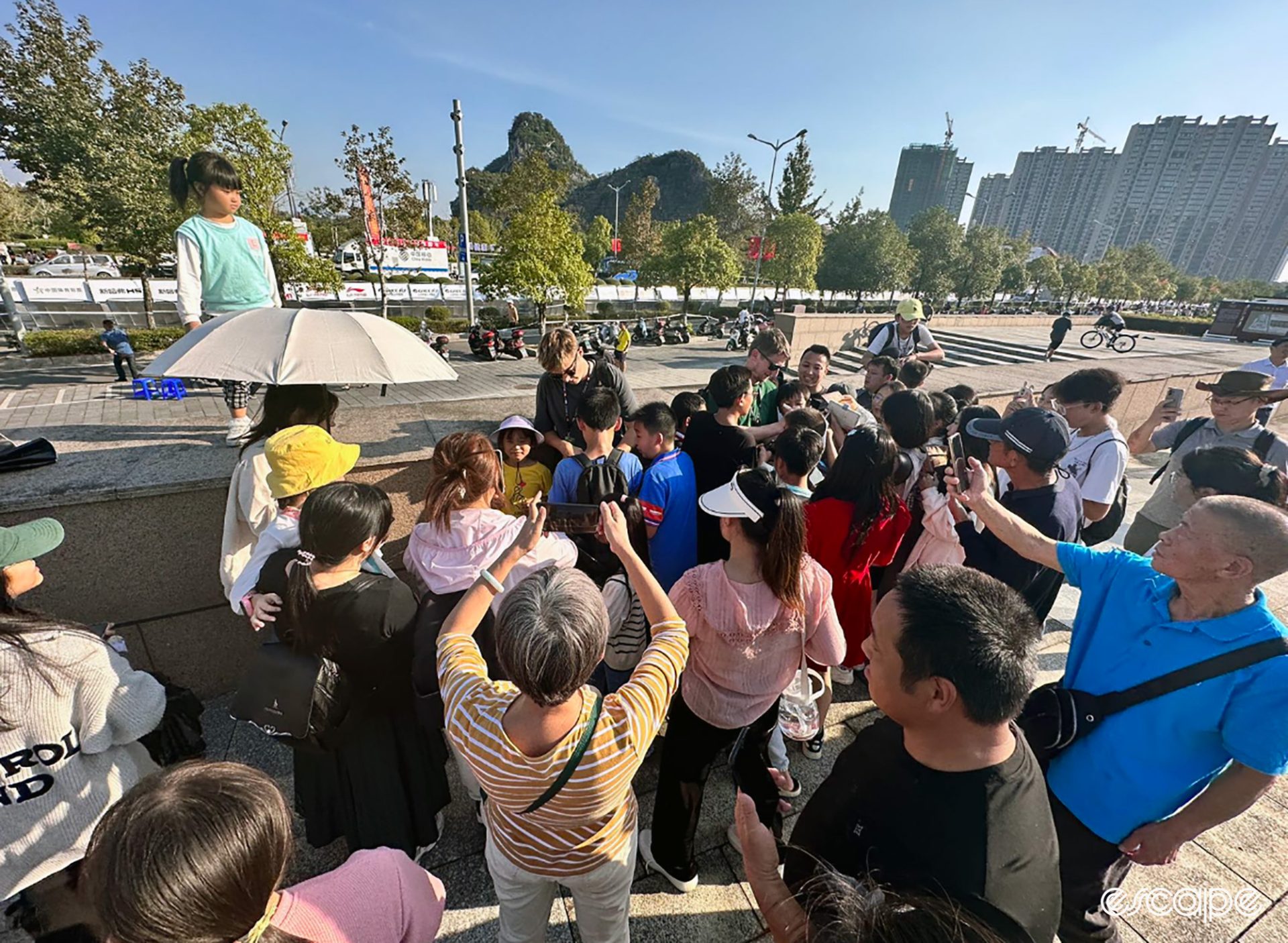
At the end of stage 2, memories of European bike racing rise to the surface, as there is a gigantic queue to exit the car park. Riders hop over to the Starbucks, probably America’s second-biggest export to the Asian continent after the military, with Movistar’s Matteo Jorgenson making his way back to his team car with a milky-looking coffee as his reward for another day out on the road in what has been a long season.
Israel-Premier Tech’s Mason Hollyman is soon spotted by the hordes of paparazzi youths and after a few selfies rolls up his window. The celeb life clearly isn’t for everyone.
‘There is only pig offal porridge’
If you were to ask me what my abiding memory of the 2023 Tour of Guangxi’s stage three is, it would have to be watching a soigneur rub suncream into Steven Kruijswijk’s back.
Maybe it was because of this sight, and that today’s stage finished and ended in the same spot in the middle of nowhere, that I decided to go off-piste and try and locate a coffee shop with air conditioning and good coffee because I am a weak-willed man of my own flavour of western liberal hellscape and if I don’t have my very specific creature comforts I cannot possibly be expected to function.
After walking on a short pavement parallel to a very straight highway for a good half hour, I come across a despondent-looking shopping mall with half of the shops shuttered. Tucked away right in the back was a thin slip of an establishment, with only the whirr of coffee beans being ground to give away the store’s purpose. The stripped-back, industrial decor was a further signal – one that in any other place would hint at a creeping gentrification – that this was what I had been looking for. One young woman was running the joint, making delicious ice coffees for me and the handful of others who drifted in and out, but the bulk of the orders were being collected and ferried by a small army of men wearing yellow helmets and uniforms who work for whatever the Chinese version of UberEats is. It was a quiet glimpse of ordinary people just trying to crack on and, importantly, enjoy good coffee.
Once you noticed one of these UberEats-adjacent couriers, you would see them everywhere. Quietly waiting in the hotel lobby, for instance, to get the lift up to the 17th floor to deliver anything and everything to the buyer’s temporary doorstep. Alongside the couriers often waiting in hotel lobbies were ornate, silver ashtrays. So you could stub your cigarette out before boarding. But don’t worry, there were also ashtrays on each floor, as well as before you entered the dining room. Rather than being a respectful touch, so that some areas were smoker-free, it just meant that the entire place would smell of cigarettes. At least it put one maxim to bed for good, that my generation is too young to smoke in pubs and too old to explore the universe. Turns out you just need to come to China to time travel and be reminded that indoor smoking bans are a great innovation. Thank you, boomers.
We were now in Nanning, and having forgotten where I was and thinking that I should learn more about where I was, I logged onto Wikipedia via the VPN I’d installed prior to arrival to read more about Guangxi, whereby ‘Guang’ literally means ‘expanse’ and ‘xi’ means ‘east’. The most striking and disturbing thing I learned was the non-famine-induced cannibalism that occurred in the region during the Cultural Revolution between 1966-76. But although that dark event is well within living memory, what was most striking was how this revelation stood in stark contrast to the people I’d met so far. Even when out and about and people weren’t wearing Tour of Guangxi-administered polo shirts and therefore being paid to be nice to us, every Chinese person we met was more respectful and friendly than you’re likely to find in most other places.
When venturing out for dinner in the evening, our routine was to find a busy spot and quickly whip out the Google translate app in order to communicate with the waiter. I can tell you exactly what the reaction would be if a Chinese tourist in the UK tried to order food by speaking into a translator app and expected the restaurant staff to comply by doing the same. At one place, abuzz with people and so seemingly a safe bet for something delicious, we are handed ‘SuperX’ beers that are sadly weaker than their name would suggest, and then tried our luck by ordering some beef and rice.
Our waiter speaks into the outstretched phone microphone, which is getting as much action at dinner tables as it is in the day’s mixed zone with riders, and we eagerly await the translation.

Well, in that case, we’ll have two pig offal porridges. Please.
The KFC I’d had in my first hour on Chinese turf was the last thing that felt familiar. These days, Instagram and cheap air fares have conspired to bring a lot of the world within reach. Cultures seem broadly if superficially understood, seen through the holiday photos of that person you barely even know let alone like and yet refuse to mute them on your socials.
China is the antidote to that. For the frail western mind, everything is a Bizarro World version of what we have at home. And yes, that includes people being nice. While it’s impossible to understand what daily life is like in a place where individual freedoms are clearly suppressed, it is clear that the 1.4 billion people who live here are simply just trying to do that. What we understand as “China” via our news is not the 99% of people who make up what China actually is.

Another evening we went out to really acclimatise with the locals, and by that I mean drink several beers. On the drive into town, as you can see above, was a van with chicken being rotisseried in transit. Sort of like when you see a mobile cement mixer on the move, except it’s delicious. These days, with the ongoing march of a very specific strain of global modernity, things can feel the same but just in a slightly different hue. Chicken on a pick-up motor-truck is one such example. And it makes you think, why don’t we have this?
Anyway, the beers. It turns out one universal constant is that after a few beers, no matter who or where you are, is people start to say what they actually think. For the Chinese people we met who spoke English and got talking to, this was a chance for them to speak freely without fear of retribution for talking about politics.
You can’t tell people what you actually think, they told us, having broached the topic of their own volition. Someone could mention that you’ve been saying things you shouldn’t be and then that could cause trouble for you. Their view is that most Chinese people don’t necessarily like or trust the government, and that everyone knows what they see on the news isn’t real. The next morning at breakfast I looked at the television showing the news; I can’t say I watched it because I understood nothing. But the scenes I saw were President Xi Jinping sat in a large meeting room surrounded by other men in suits all taking written notes on pieces of paper. It could have been a show for all I knew.
Back to bike racing
Stage 4 was the one everyone had been waiting for as it was the only one that wasn’t going to end in a sprint finish. The summit finish of the Nongla Scenic Spot was indeed scenic, a whole raft of dances and drumming put on for the local television cameras and the riders as they zoomed past up the climb. As the bunch snakes past our vantage point up on the balcony of a hotel above the road, you can see Ineos Grenadiers’ Leo Hayter shake his head as EF Education First-EasyPost’s Hugh Carthy lets the gap go.
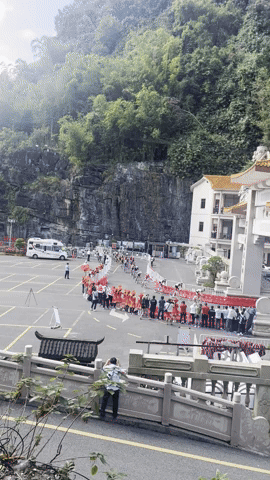
We rush back inside to watch the finale on TV and see a Jumbo-Visma rider off the front, doubling up on Olav Kooij’s victory the day before. Without English commentary and watching over someone’s shoulder from a distance, we’re unsure of who the rider is. We assume it’s the suncreamed Kruijswijk but turns out it’s Milan Vader; the empire doesn’t so much strike back but finish off the 2023 WorldTour season as it has treated it all year, by bending it Force-like to the Dutch team’s will.
In his post-race interview, Vader is overcome with emotion; having broken his spine in 11 places in a serious crash at last year’s Itzulia Basque Country, it’s been a long road back for the 27-year-old, who didn’t know if he’d ever ride a bike again, let alone take a first professional victory. Little wonder he was the first, and maybe only, Jumbo-Visma rider to tell team management he was down to race the Tour of Guangxi.
Back in the press room a man is smoking at his desk. This is what it must have been like to be a reporter at the Tour de France in the 1990s. The drive to the hotel takes us past an unending series of limestone karst hills. If he could, Vader would probably race up those too.
We finally arrive in Guilin, a touristic centre of the region. On the first night, finding a bar a stone’s throw away from the hotel, we get chatting to a guy from the very northeast of China, right near the Russian and North Korean borders. He works at a hydroelectric dam and his company have paid for him to take a holiday here along with his wife who seems charmed neither by Guilin or by our presence interrupting her vacation. It turns out he not only speaks Mandarin and English but also Russian. Madness.
Back at the hotel I walk past Luke Plapp, who DNFed early on stage 4 but is still here, knocking about. Maybe an earlier flight back to Australia was prohibitively expensive. I check a flight price scanner and they are upwards of $700. I close my laptop and try to dispel all thoughts of Plapp and my guesstimations of his financial situation and whether if I was in his cleats I would drop that much money to get me home three days quicker. Unfortunately, there is a flashing police light outside my hotel window that is on all night so now I get to lie awake and pretend what it must be like to be Luke Plapp if he found himself running from the law and the cops were closing in on him.
It’s the final stage 6! To celebrate I head to what must be the fourth different Starbucks I’d frequented during the week in China. Each visit featured the begrudging acceptance that here was a place I could fully relax in thanks to decent coffee and WiFi that seemed to welcome the warming embrace of a VPN connection. Each trip was also laced with pangs of guilt and embarrassment at being a white guy in Asia visiting a Starbucks. In Beijing, finally enough was enough, as I stepped into yet another branch but found two guys who may as well have been me queueing directly in front and I couldn’t bring myself to be the third member of this Inbetweeners spin-off. Anyway, back to the Guilin Starbucks (sigh). Not only do I bump into some of our Chinese handlers also sheepishly rushing in before the race start, but some EF Education staff have also succumbed.
“It’s going to be a 10-minute wait,” the apologetic barista tells the cycling team, who might as well have been told the world was about to end.
“Five minutes!” They quite rudely try to bargain, likely out of pure un-caffeinated desperation, as if the 10-minute wait has been randomly assigned to them and no-one else.
“10 minutes,” comes the matter-of-fact reply from the barista.
“7 minutes?”
They eventually get their coffees and rush back to the start line, where Milan Vader still has the leader’s jersey on his back and, barring disaster on the Guilin circuit, will take it back to Europe with him. And indeed he does, with Kooij winning a second stage to mark a fitting ending to Jumbo-Visma’s utterly dominant 2023 campaign.
DSM-Firmenich’s Andreas Leknessund and Sam Welsford are already in party mode. Having arrived in China but DNSed stage 1 due to illness, they’ve also hung around and can barely wait to bring the cool box filled with beers into the throng of finished riders and begin handing them out.
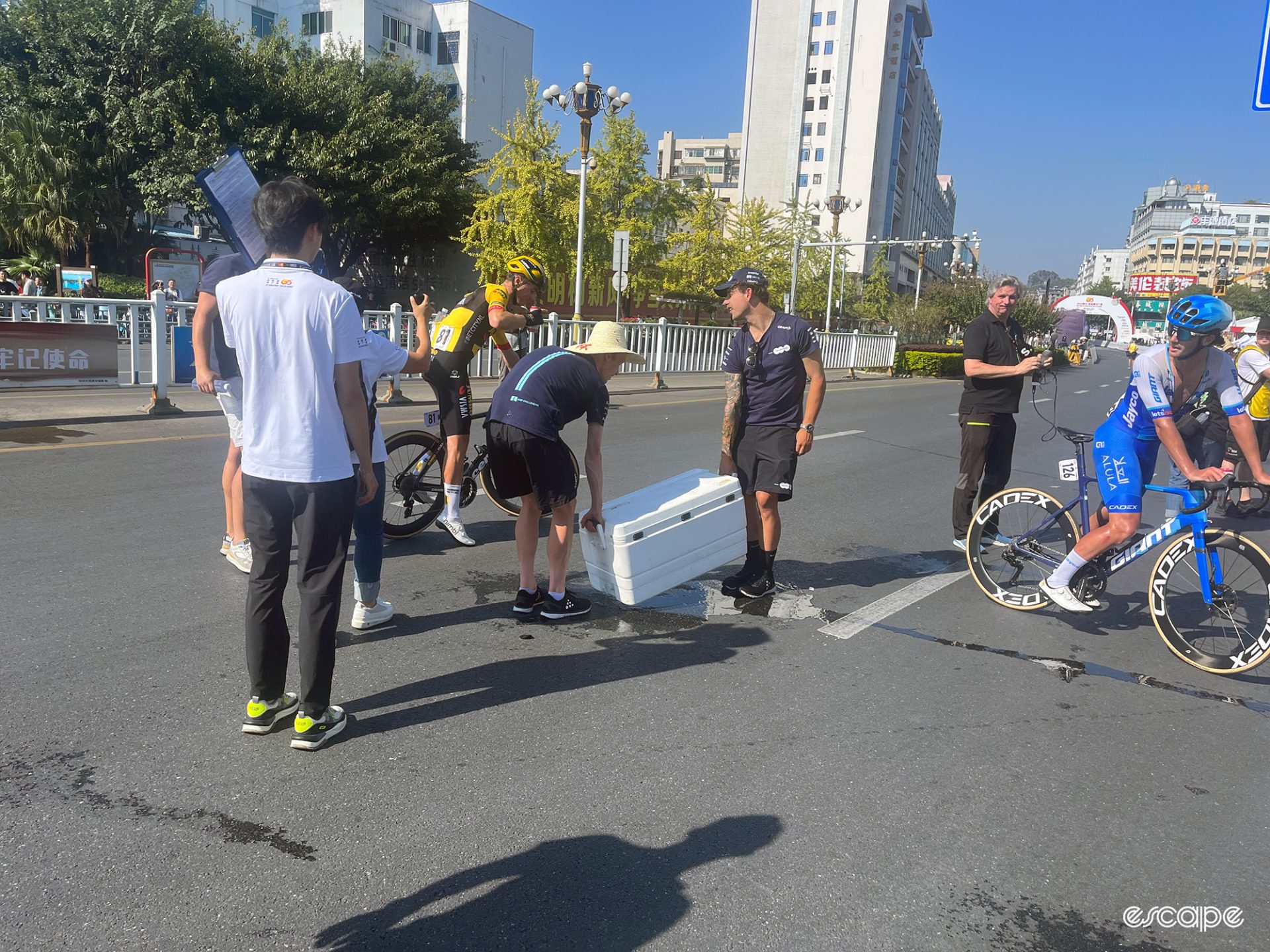
A while after the cool box has been carried back to the hotel, Shane Archbold crosses the final finish line of his career, accompanied by his longtime teammate Sam Bennett. The Flying Mullet is doing all he can to hold back tears lest he become the Crying Mullet. It’s certainly one way to end a career, but maybe today he is glad to have done it with little fanfare, so it doesn’t seem any more real.
At the hotel, Vader is at the bar, lifting up a plastic bag and the clinking sound reveals they are beers, presumably for the boys.
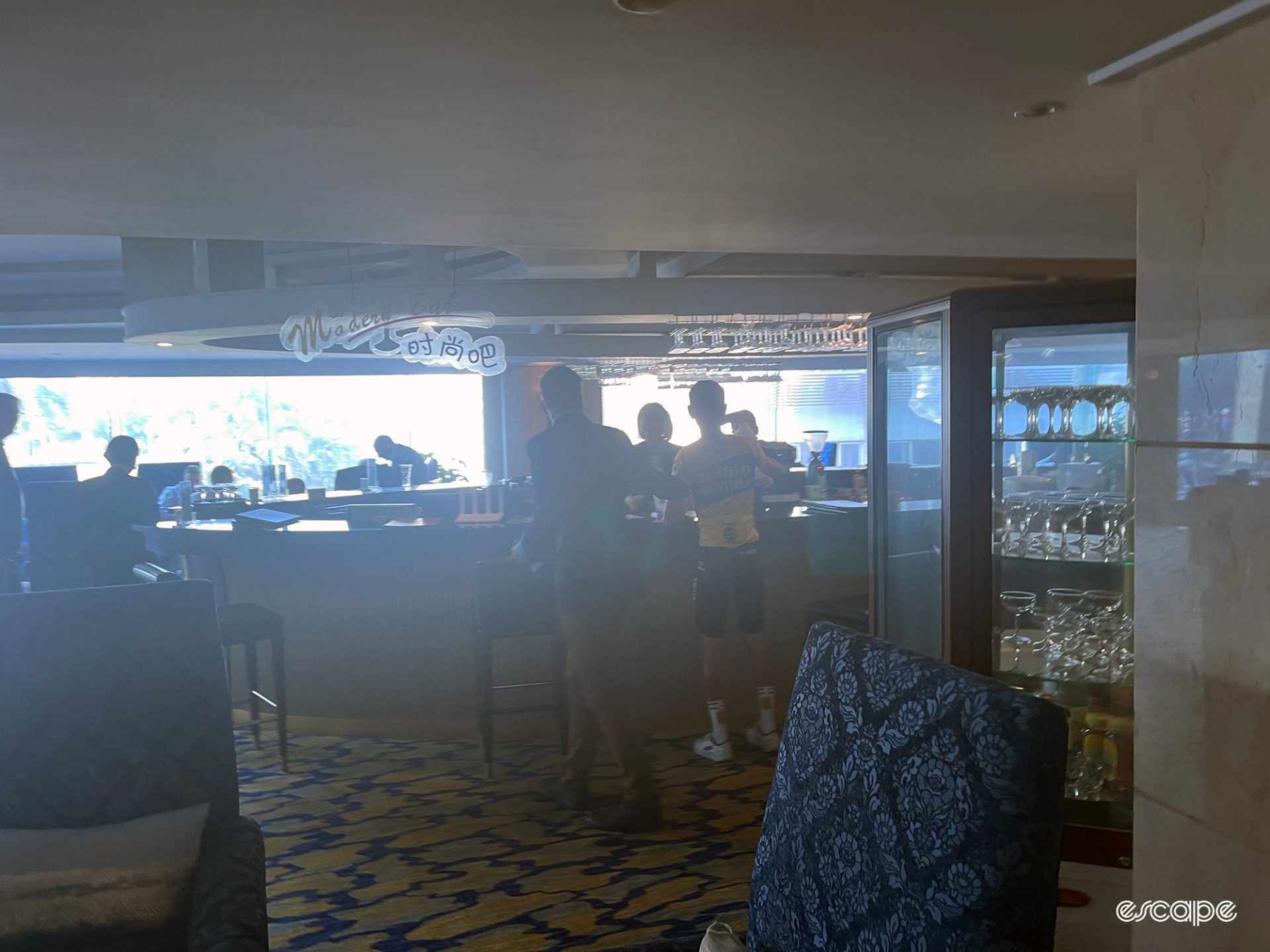
We step into a lift to go up to our rooms and a couple of UAE Team Emirates riders join before the doors close. One leans against the wall and puffs out his cheeks.
“Long week?” I ask.
“And now we go to UAE training camp for a week too,” comes the response. The work is hardly ever done.
However, there is one night off, with the male riders joined by the female riders who’ve raced their one-day Tour of Guangxi for the race’s closing ceremony at a swanky hotel. Some have gone all out and dressed to the nines, others clearly didn’t pack anything else other than their team-issue tracksuit. It’s a humorous dissonance.
Various courses come and go, the speeches go on and on from party members and a UCI head honcho. It’s revealed there will be at least five more years of racing in Guangxi, which is a good thing. The vibe is very much that this has been a great cultural exchange, and it is hard to not feel there have been many positive vibes this week despite a final and overly long dinner that is short on fun and big on grandiose spectacle doing its best to suck all the joy out of the room.
One silver lining, though, is an official Tour of Guangxi song is performed, with the memorable line: “Welcome to Guangxi! Share this green healthy breath with you!” Thank you, I will.
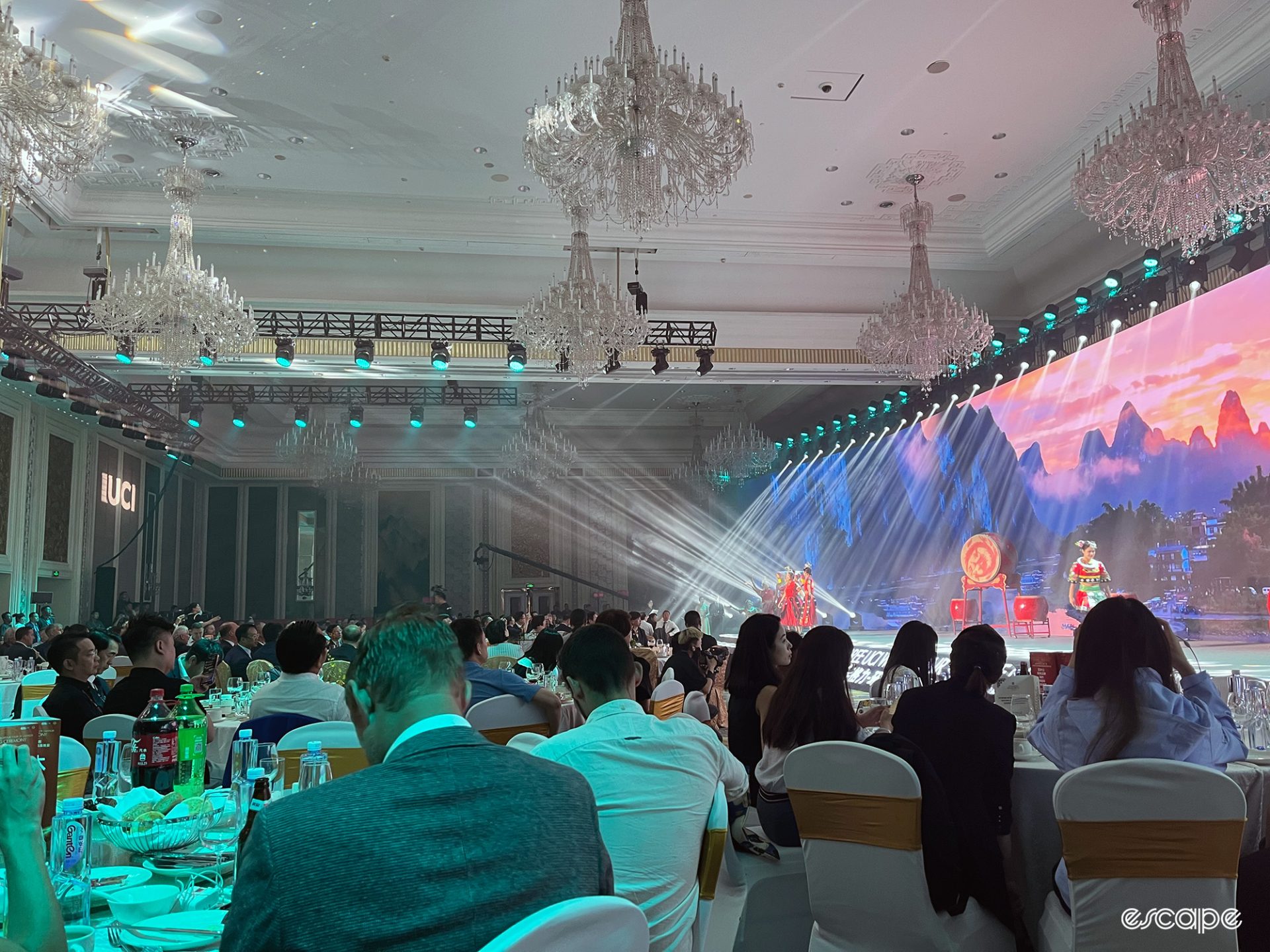
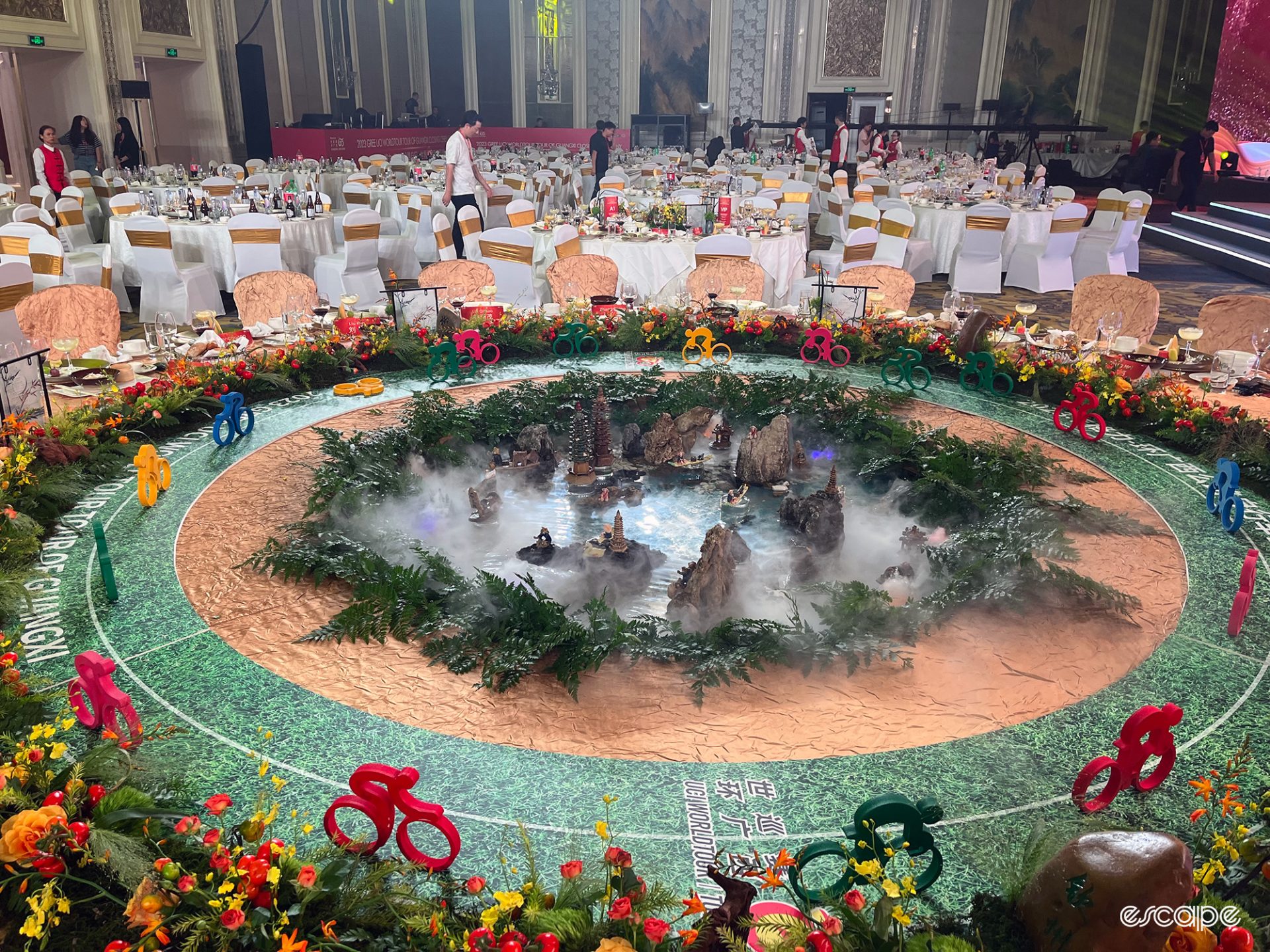
The next morning, Leo Hayter hands a bunch of flowers to the hotel concierge on his way out as thanks in what is a rather sweet moment that he thinks has gone unnoticed by everyone.
At the airport, we’re stopped as soon as we walk through the doors, contained in a small square right after the entrance. Again, we are forced to get the Google Translate out.

Turns out, somehow, they are pre-scanning you and your luggage for bombs? Another pro tip when flying in and through China, or anywhere in East Asia. Try not to bring podcasting equipment or anything with removable batteries in it with you. The security people will lose their shit each and every time. I managed to get my bag scanned a record THREE times before one flight.
Rigoberto Urán slides past on the way to the gate, sitting on his suitcase and pushing himself along with his legs, a living archetype of the pro cyclist’s mantra “Never stand when you can sit.” Meanwhile, in the one serviceable coffee shop, half of the UAE Team Emirates entourage have single-handedly caused a 25-minute backlog by mass-ordering coffees and waffles.
A 48-hour layover in Beijing reveals more of China, but fewer of the eccentricities of Guangxi. In the capital, the barbers may cut hair dressed in suits, but a kid runs up to the entrance of McDonald’s just like any other kid anywhere else in the world does. Because McDonald’s is great. Especially when you’re four years old. After finding a great bar, and one of the rare few that has café-culture seating so you can sit and watch the world go by, I immediately go to speak into Google Translate to try and order a beer, but am interrupted by the owner who speaks perfect English and talks me through his selection. Mortifying. At least the pints here cost £7.50 so I paid the price for my actions, and also got to feel like I was back at home in London as my wallet lightened considerably. Later, I walk back to my hotel and feel the safest I ever have walking in any city after dark. There are trade-offs to be made.
There is a rigidity to people’s public behaviour. A codified way of being. And there is always a camera waiting to catch you jaywalking – I dread to think what my social score is. But there is no need to dread, because I can and did leave. For the people in China we met, who felt certain unspeakable emotions about how things were in the country they were born in, there is the duality of being from a place that is yours and you want to call yours forever, and the current tax to your spirit that remaining there costs you every day. It’s an existential haze of wanting change but the overwhelming mystification of figuring out how and where to even begin.
The Red Scare we still experience in the West is real and gives us a refracted picture of China and Chinese people. That is what anyone with their eyes open who attended the Tour of Guangxi will have taken away with them. Just like us, there is worry for the future. For regular Chinese people, there is particular concern with the housing market and the effects of the wider economy, and individuals have very little agency to try and shape how things will play out. But alongside that anxiety is a hope, buried deep down in case it’s ever found by the wrong person, that some day things may be different.
What did you think of this story?
